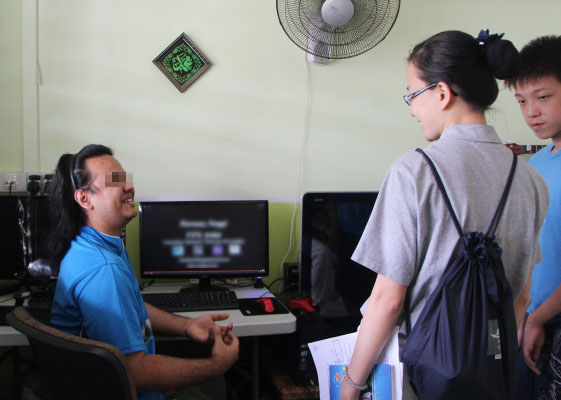 Since quitting her job, 63-year-old Ho Ngit Wah has been caring for her 102-year-old demented mother for four years. (Photo by Wong Twee Hee)
Since quitting her job, 63-year-old Ho Ngit Wah has been caring for her 102-year-old demented mother for four years. (Photo by Wong Twee Hee)
She stays close to her mother at night to care for her and helps her mother into the wheelchair as soon as she wakes up in the morning. After that, she showers her mother, has breakfast with her and feeds her medicine with the help of a maid. Lastly, she buys a packet of chee cheong fun for her mother before rushing out for her part-time job. On the way home from work at 5 p.m., she would takeaway freshly made chee cheong fun. Upon reaching home, she would patiently wait for her mother to cut them up with scissors and eat them bit by bit.
All the above are the daily routines of 63-year-old Ho Ngit Wah, who has been caring for her 102-year-old demented mother for four years.
Having parents who live long is seen as a blessing. In 2019, the average life expectancy of Singaporeans was 83.7 years, with the average life expectancy for women reaching 85.9 years, one of the longest average life expectancies in the world.
However, as people live longer, a 2019 report pointed out that the time spent by the nation’s sick and unhealthy population has correspondingly increased to 10.5 years. This implies that the last decade of one’s life is generally spent in conditions requiring care such as being disabled, bedridden, unable to speak etc., and this number of years will continue to climb year on year as the population ages.
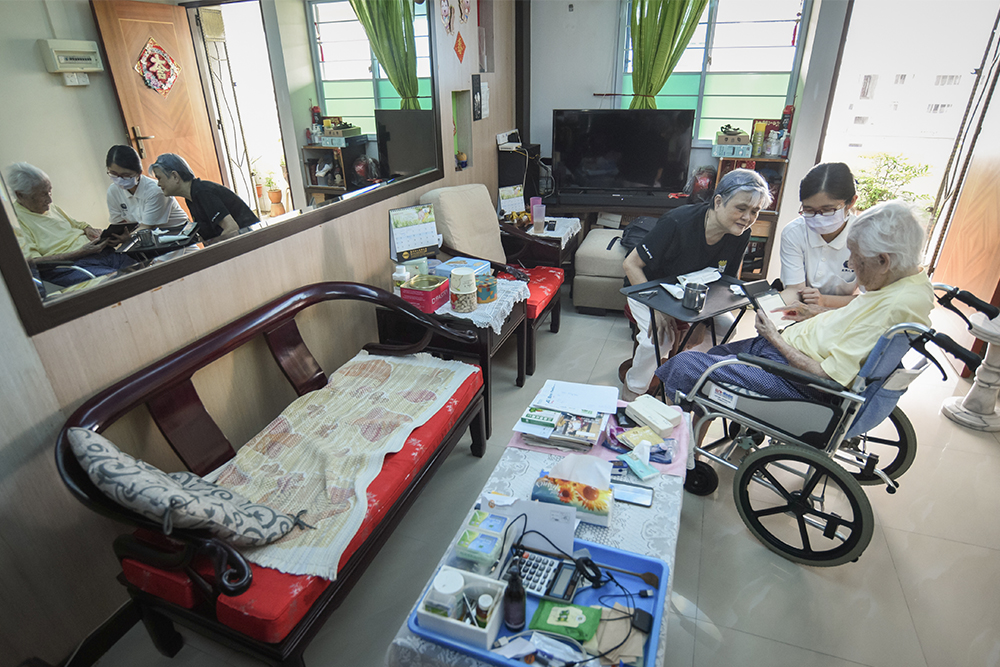 Ho Ngit Wah’s mother suffers from multiple chronic illnesses and dementia. She requires assistance with her daily life and stays at home every day. (Photo by Wong Twee Hee)
Ho Ngit Wah’s mother suffers from multiple chronic illnesses and dementia. She requires assistance with her daily life and stays at home every day. (Photo by Wong Twee Hee)
An inevitable meltdown caused by burnout and devastation
While Ngit Wah has other siblings, as the unmarried child in the family, she sees herself as the natural caregiver for her mother. After her mother started developing multiple chronic illnesses combined with dementia, Ngit Wah decided to quit her job and stay home to better care for her. That decision altered her life forever.
Fearing that her mother would get up in the middle of the night and accidentally hurt herself, Ngit Wah used to sleep for only three hours every night. As soon as the maid took her rest at midnight, she would take over to care for her mother, helping the elderly to go to the toilet every one to two hours and be on guard almost without rest until the following day.
Such days of severe sleep deprivation lasted for more than a year. Deep into the nights, Ngit Wah would sit in a chair and watch episode after episode of Master Sheng Yen’s teachings on her phone to calm herself down. She said: “Master Sheng Yen provides the answer to facing the challenges in life as his teachings are very close and relevant to daily life.”
Caring for the elderly with dementia is both physically and mentally demanding. Ngit Wah, whose hair has turned slightly grey, cannot forget her mother’s previous behaviour: refusing to take medication, refusing to cooperate in many situations, becoming paranoid and cursing nonstop when agitated.
She said: “She scolded me so badly that I wanted to run away from home.”
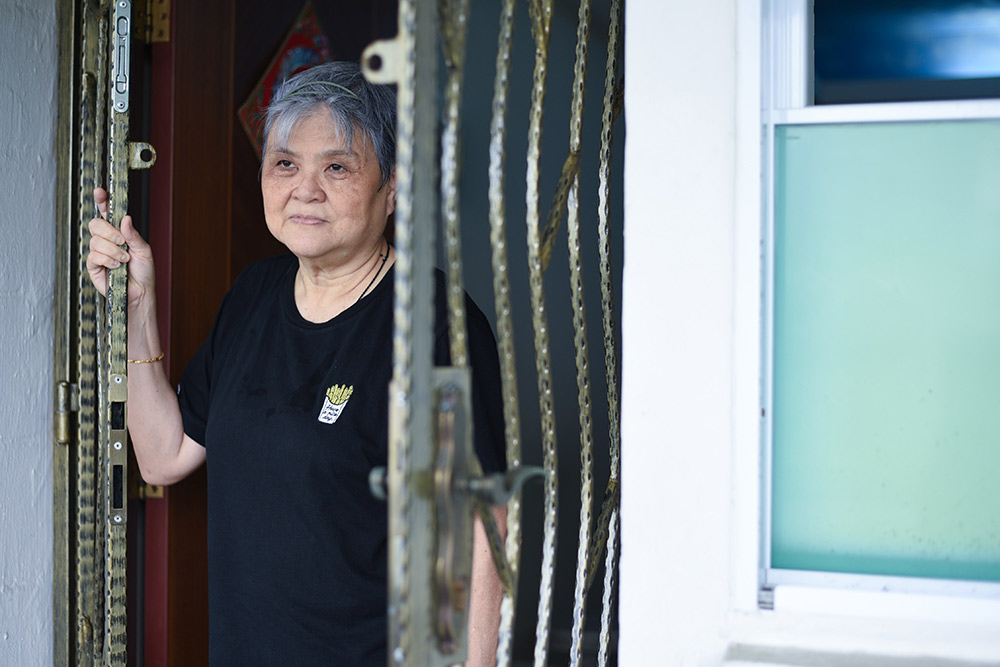
The journey of looking after an elderly mother seems endless. She has no one to talk to about the physical exhaustion and mental turmoil she is facing. (Photo by Wong Twee Hee)
Further aggravating her situation, Ngit Wah uncovered a shocking fact at the point when she was physically exhausted and mentally drained — her dementia-stricken mother unwittingly revealed the truth about her being an adopted daughter. Heartbroken and devastated by what she heard, she sought confirmation from her elder sister.
Ngit Wah has been devotedly caring for her mother for several years. She doesn’t have much of a life of her own. When feeling emotionally distressed and depressed, she couldn’t see the end of such days in her long journey of looking after the elderly and couldn’t find an outlet to release her emotions. All these factors had driven her towards depression.
Fortunately, a Tzu Chi home care personnel visited her home at that time and provided her with mental support, so she did not have to bear the physical and psychological strain alone.
Opening a new door for some respite
The home care team visits Ngit Wah’s mother at least once a month to check on her and monitor her health indicators. They also listened patiently to Ngit Wah to understand her feelings, thoughts and needs. The medical staff taught Ngit Wah ways to care for her mother and herself, even encouraging her to volunteer in Tzu Chi’s medical missions.
These gestures may appear insignificant and simple, but they have saved Ngit Wah’s life by pulling her back from the brink of collapse.
“It is reassuring to be able to ask any questions at any time,” Ngit Wah said. “There is no way to express such gratitude in words.”
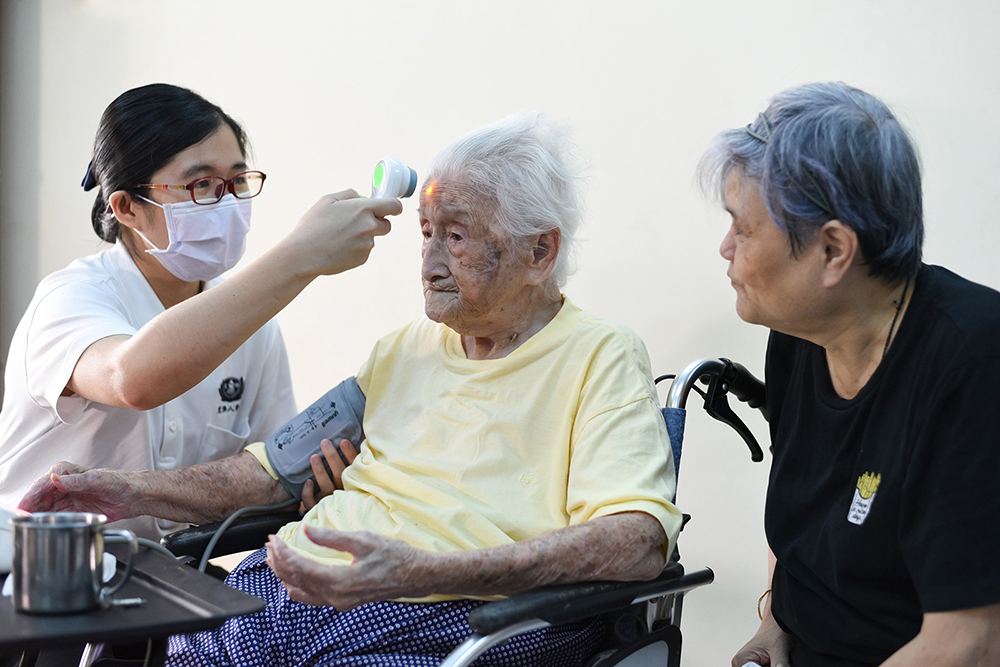 The home healthcare team visits Ngit Wah’s mother at least once a month to check on her health and listens patiently to Ngit Wah’s (right) feelings, thoughts and needs.
The home healthcare team visits Ngit Wah’s mother at least once a month to check on her health and listens patiently to Ngit Wah’s (right) feelings, thoughts and needs.
Ngit Wah later followed the medical team to serve as a volunteer, visiting several homes to accompany the patients and their families. The various patients she saw made her realise the similar suffering she and others shared.
Even though it was only for a few hours a week, the simple, unadulterated effort of volunteering calmed her unsettled mind.
“I hope to transfer the merit and virtue to my mother as well.”
Ngit Wah always reminds herself that it is a rare affinity to be born as mother and daughter. She said: “Where there is a cause, there will be a consequence. This is our previous karmic affinity before we became mother and daughter, and I hope to put an end to it in this life.”
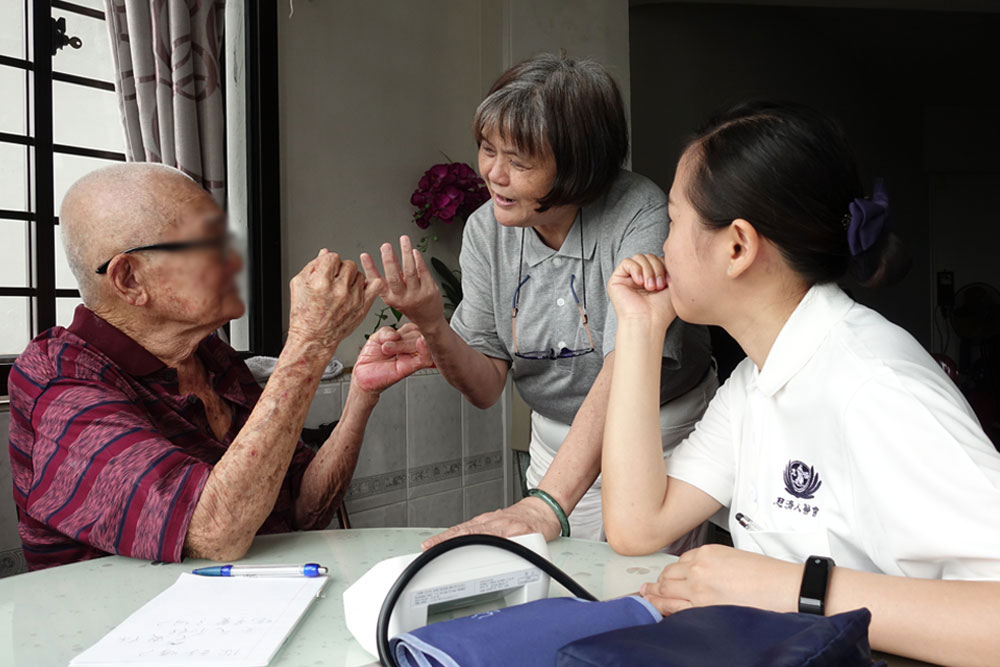 Feeling the sincerity in the companionship of the medical home care team, Ngit Wah (middle) took the initiative to join the medical home visits, and that was how her path as a Tzu Chi volunteer started. (Photo by Pang Lun Peng)
Feeling the sincerity in the companionship of the medical home care team, Ngit Wah (middle) took the initiative to join the medical home visits, and that was how her path as a Tzu Chi volunteer started. (Photo by Pang Lun Peng)
Finding purpose in life beyond taking care of her mother
In the past four years, Ngit Wah has been relearning the meaning of caregiving. She finally realised that the most challenging part of caring for her mother does not lie in handling the daily routines but in noticing and finding out her mother’s feelings and needs amid communication barriers.
Ngit Wah gave an example of her mother’s habit of needing to eat chee cheong fun twice a day. She would still buy them twice daily because she noticed that her mother looks forward to the feeling of “someone deliberately bringing home food”.
 Eating freshly made chee cheong fun with her mother is part of Ho Ngit Wah’s daily routine. (Photo by Wong Twee Hee)
Eating freshly made chee cheong fun with her mother is part of Ho Ngit Wah’s daily routine. (Photo by Wong Twee Hee)
On the day of the interview, we ran into Choo Mei Mei, a home care nurse, who had come to Ngit Wah’s house to check on her mother’s lung inflammation condition.
While inspecting, Ms Choo chatted with Ngit Wah to check in on them. During the process, Ms Choo found that Ngit Wah’s mother’s skin was unusually dehydrated and fragile and noticed that the elderly was hesitant to apply lotion because she disliked the feeling of oiliness on her skin.
While inspecting, Ms Choo chatted with Ngit Wah to check in on them. During the process, Ms Choo found that Ngit Wah’s mother’s skin was unusually dehydrated and fragile and noticed that the elderly was hesitant to apply lotion because she disliked the feeling of oiliness on her skin.
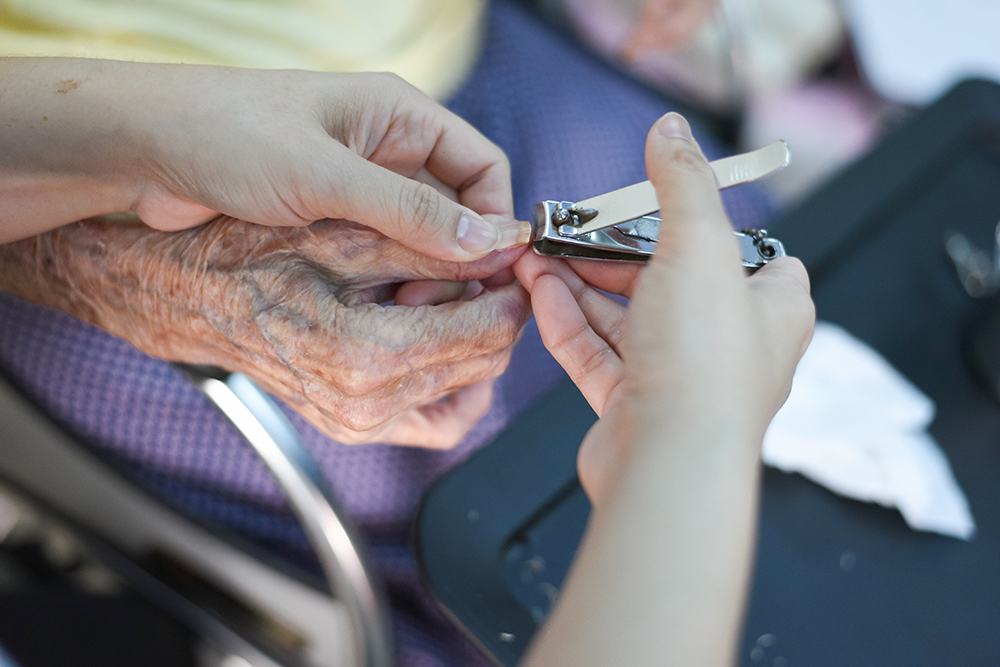 Nail trimming is an ordinary routine for the average person. However, for an elderly person with dementia, it requires some tactic and gentleness to coax the elderly into having his or her nails trimmed. (Photo by Wong Twee Hee)
Nail trimming is an ordinary routine for the average person. However, for an elderly person with dementia, it requires some tactic and gentleness to coax the elderly into having his or her nails trimmed. (Photo by Wong Twee Hee)
“Grandma, do you remember my name?”
Diverting the attention of the elderly, Ms Choo intimately held hands with the old lady and gently patted her face. She would ask the same question each time she visits her patient.
“Mei Mei ah?”
Seated in a wheelchair, Ngit Wah’s mother thought for a while and answered with a slight hesitation.
“That’s right!”
Ms Choo came up to the old lady who has hearing difficulty and answered her loudly. They then held hands and started chatting and laughing.
On the surface, it may seem troublesome and time-consuming for the daughter and nurse to persuade the elderly several times just to trim her nails and apply lotion. However, instead of treating the mother as a “troublemaker” or getting the elderly to give in by force, Ngit Wah and Ms Choo combined their knowledge and experience to find different ways to interact with the old lady.
Seeing all that happening in front of me, I couldn’t help but ponder the value of a demented elder and the purpose of the caregiving process.
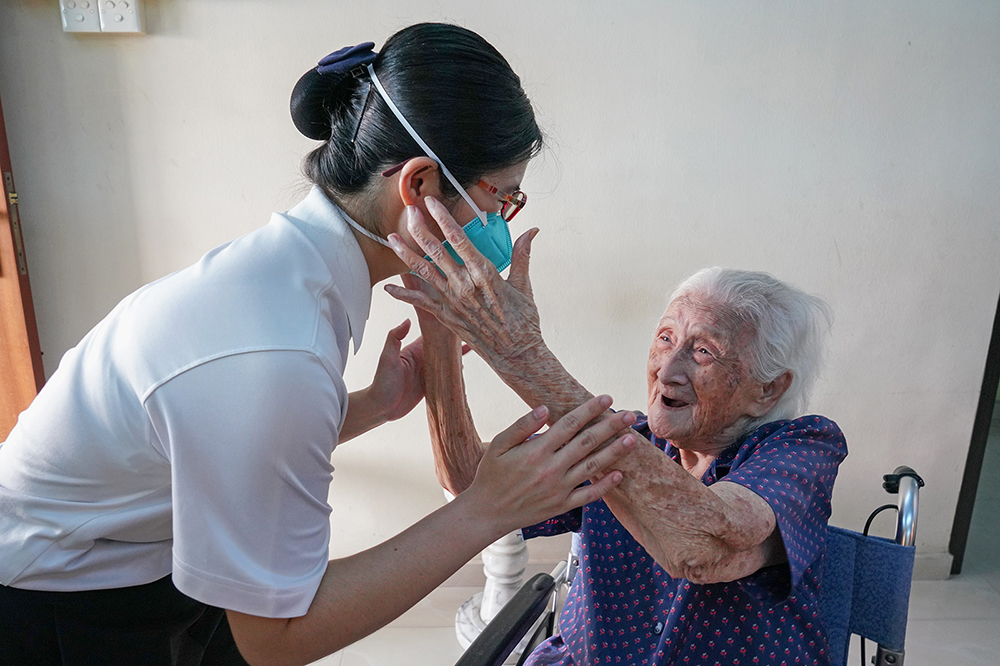 “Granny, do you remember my name?” Ms Choo would hold Ngit Wah’s mother’s hands and gently pat her face as she asks the same question every time she visits her. (Photo by Chan May Ching)
“Granny, do you remember my name?” Ms Choo would hold Ngit Wah’s mother’s hands and gently pat her face as she asks the same question every time she visits her. (Photo by Chan May Ching)
Dark eye circles started to form on Ngit Wah’s face after her mother’s accidental fall in 2021. Her mother became completely disabled as a result of the accident, and she had to rely on others for almost everything except eating.
No one knows how much longer Ngit Wah’s caregiving journey will be. Ngit Wah, on the other hand, is optimistic about her elderly life in the future. She is now working part-time as a medicine dispenser in a TCM clinic and has already decided to spend her life serving others by assisting with medication dispensing at Tzu Chi’s free clinic in the future.
She said: “I don’t feel comfortable leaving my mom alone for now, but my mom will leave one day. When she’s no longer around, I will start doing volunteer work.”


